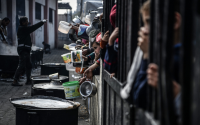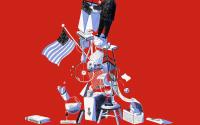Thursday, September 15, 2005
By Matt SutkoskiFree Press Staff WriterGlobal warming could freeze some of us to death, said Richard Alley, a noted global climate specialist, told a University of Vermont audience Wednesday. The good news, Alley said, is humans are probably smart and ambitious enough to ease climate threats brought on by rising levels of carbon dioxide in the atmosphere. Alley, a Pennsylvania State University geologist, has studied ice cores from Greenland, which offer clues to the climate over the course of 110,000 years. His research suggests that subtle changes in atmospheric patterns leave parts of the globe susceptible to abrupt and dramatic climate shifts that can last decades or centuries. For instance, Europe and parts of eastern North American could in a matter of a few years revert to a cold, windy regime, akin to the weather in Siberia. Such shifts have occurred frequently over the millennia, Alley's research shows. A gradual change in atmospheric temperature, such as global warming, could push the climate to a threshold where such a shift suddenly occurs, he said. Alley told his audience of about 200 people in a UVM lecture hall Wednesday evening that he couldn't predict if, when or where sudden shifts toward cold, heat, drought or water could occur under global warming, but it is something everyone should consider. Almost all scientists agree that increasing levels of carbon dioxide in the atmosphere created as humans burn fossil fuel is warming the planet. How to respond to the warming is a matter of intense political, scientific and economic debate worldwide. Alley said he is upbeat about global warming because enough clever people exist in the world to find other reliable energy sources besides fossil fuels. People already have eased other environmental problems, such as DDT and phosphate pollution, "Carbon dioxide is the latest in a line of problems we can solve," Alley said. He urged his audience to work toward those goals. He said people can get rich finding marketable alternatives to fossil fuel."Wouldn't it be useful if the United States were to have a piece of the action. Wouldn't it be useful if some bright students from UVM were to have a piece of the action," Alley said. Earlier Wednesday, on a smoggy Vermont afternoon with temperatures flirting with record highs, Alley said if people and nations work together, limiting global warming is manageable. Most of the globe's problems would worsen however, without action on climate change. "This is not the biggest problem in the world. The biggest problem in the world is getting along with each other. But it's part of that because we're not going to get along with each other if we're not getting along with the planet," Alley said.






